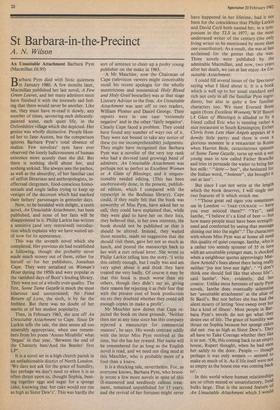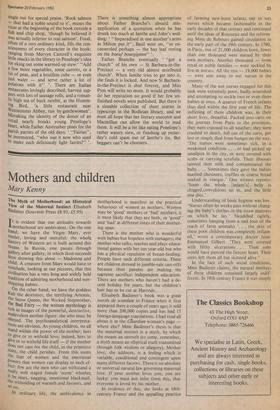St Barbara-in-the-Precinct
A. N. Wilson
arbara Pym died with Stoic quietness Li in January 1980. A few months later, Macmillan published her last novel, A Few Green Leaves, and her many admirers must have finished it with the intensely sad feel- ing that there would never be another. Like me, they must have re-read it slowly, any number of times, savouring each delicately- painted scene, each quiet life, in the Oxfordshire village which she depicted. Her genius was wholly distinctive. People liken- ed her to Jane Austen, but the comparison ignores Barbara Pym's total absence of malice. Few novelists' eyes have ever observed the lonely ludicrousness of human existence more acutely than she did. But there is nothing shrill about her, and nothing unkind. She always sees the pathos, as well as the absurdity, of her familiar cast of selfish librarians and anthropologists, in- effectual clergymen, food-conscious homo- sexuals and single ladies trying to keep up vestiges of the decorum which had marked their fathers' parsonages in genteeler days.
Now, to be heralded with delight, a tenth novel, An Unsuitable Attachment, has been published; and none of her fans will be disappointed in it. Philip Larkin has written a sensitive (and very restrained) introduc- tion which explains why we have waited un- til now for its appearance.
This was the seventh novel which she completed. Her previous six had established a following, though she probably never made much money out of them, either for herself or for her publishers, Jonathan Cape. They were serialised on Woman's Hour during the 1950s and were popular in the vanished days of Boot's lending library. They were not of a wholly even quality. The first, Some Tame Gazelle is much the most hilarious and unrestrained; No Fond Return of Love, the sixth, is by far the feeblest. But there was no doubt of her merits or of her modest popularity.
Then, in February 1963, she sent off An Unsuitable Attachment to Cape. Since Dr Larkin tells the tale, the date seems all too miserably appropriate, when one remem- bers from his poem 'Annus Mirabilis' what `began' in that year, 'Between the end of the Chatterly ban/And the Beatles' first LP'.
It is a novel set in a high Church parish in an unfashionable district of North London. `We dare not ask for the grace of humility, but perhaps we don't need to when it is so often thrust upon us, thought Sophia, beat- ing together eggs and sugar for a sponge cake, knowing that her cake would not rise as high as Sister Dew's'. This was hardly the sort of sentence to cheer up a pushy young publisher on the make in 1963.
A Mr Maschler, now the Chairman of Cape (television viewers might conceivably recall his recent apologia for the wholly meretricious and nonsensical Holy Blood and Holy Grail bestseller) was at that stage Literary Adviser to the firm. An Unsuitable Attachment was sent off to two readers, William Plomer and Daniel George. Their reports were in one case 'extremely negative' and in the other 'fairly negative'. Clearly Cape faced a problem. They could have found any number of ways out of it. They were not bound to take any notice of these (to me incomprehensible) judgments. They might have recognised that Barbara Pym was a novelist of the very top rank who had a devoted (and growing) band of admirers. An Unsuitable Attachment was perhaps not as perfect as Excellent Women or A Glass of Blessings; and it unques- tionably needed editing. (This has been unobtrusively done, in the present, publish- ed edition, which I compared with the typescript in the Bodleian library). Cape could, if they really felt that the book was unworthy of Miss Pym, have asked her to call; they could have explained that, while they were glad to have her on their lists, they believed that, in her own interests, the book should not be published or that it should be altered. Instead, they waited three months, made no suggestion that she should visit them, gave her not so much as lunch, and posted the manuscript back to her with a curt refusal letter. She wrote to Philip Larkin telling him the story. 'I write this calmly enough, but I really was and am very upset about it and think they have treated me very badly. Of course it may be that this book is much worse than my others, though they didn't say so, giving their reason for rejecting it as their fear that with the present cost of book production etc etc they doubted whether they could sell enough copies to make a profit°.
Mr Maschler now denies that Cape re- jected the book on these grounds. 'Neither then nor at any time since has this company rejected a manuscript for commercial reasons', he says. His words contrast oddly with the letter Miss Pym received at the time, but she has her reward. Her name will be remembered for as long as the English novel is read, and we need not sling mud at this Maschler, who is probably more of a fool than a knave.
It is a shocking tale, nevertheless. For, as everyone knows, Barbara Pym, who brave- ly wrote a few more novels in spite of this ill-mannered and needlessly callous treat- ment, remained unpublished for 15 years; and the revival of her fortunes might never
have happened in her lifetime, had it not been for the coincidence that Philip Larkin and David Cecil both named her, in a sym- posium in the TLS in 1977, as the most underrated writer of the century (the only living writer to be mentioned by more than one contributor). As a result, she was at last acclaimed for the genius that she was. Three novels were published by the admirable Macmillan, and now, two years after her death, we can at last enjoy An Un- suitable Attachment.
I could fill several issues of the Spectator saying what I liked about it. It is a book which is well up to her usual standard and rich not only in all the familiar Pym ingre- dients, but also in quite a few familiar characters too. We meet Everard Bone again (from Excellent Women); Wilf Bason (A Glass of Blessings) is alluded to by a friend called Eric who is running rather a nice restaurant in South Kensington; Esther Clovis from Less than Angels appears at a dowdy little party; and there is even a glorious moment in a restaurant in Rome when Harriet Bede, curatolatrous spinster of Some Tame Gazelle, turns up with a wet young man in tow called Father Branche and tries to persuade the waiter to bring her hot milk: "latte — hot", she hesitated for the Italian word, "bolente", she brought it out at last'.
But since I can not write at the length which the book deserves, I will single out two features of it which struck me.
"Those great red signs you sometimes see in London — TAKE COURAGE — have you ever noticed them?" "Yes", said Ianthe, "I believe it's a kind of beer — but how many people must have been strength- ened and comforted by seeing that message shining out into the night" .' The characters with whom Miss Pym was at home all need this quality of quiet courage. Ianthe, who is a rather too seemly spinster of 35 in love with an unsuitable younger man, is shocked when a neighbour quotes approvingly Mat- thew Arnold's lines about there being really neither 'joy nor love nor light'. "I don't think one should feel like that about life", said Ianthe'. Nor, evidently, did her creator. Unlike most heroines of early Pym novels, Ianthe does eventually solemnise her 'unsuitable attachment' at the altar of St Basil's. But not before she has had the silent misery of letting 'love sweep over her like a kind of illness'. Most people in Bar- bara Pym's novels do not get what they desire out of life. The grace of humility was thrust on Sophia because her sponge cakes did not rise as high as Sister Dew's. TheY all have to Take Courage whether they like it or not. 'ph, this coming back to an empty house, Rupert thought, when he had seen her safely to the door. People — though perhaps it was only women — seemed to make so much of it. As if life itself were not as empty as the house one was coming back to'.
In this world where human relationships are so often muted or unsatisfactory, food bulks large. That is the second feature of An Unsuitable Attachment which I would single out for special praise. 'Rock salmon — that had a noble sound to it', muses the vicar at the beginning of the book outside a fish and chip shop, 'though he believed it was actually inferior to real salmon'. Food, often of a very ordinary kind, fills the con- sciousness of every character in the book: ranging from Mervyn Cantrell's exquisite little snacks in the library to Penelope's idea for eking out some warmed-up stew:' "Add a few more vegetables, some carrots, or a tin of peas, and a bouillon cube — or even Just water — and serve rather a lot of Potatoes with it" '. There are Italian restaurants lovingly described; harvest sup- pers with lots of sausage rolls; and a roman- tic high tea of buck rarebit, at the Humm- ing Bird, 'a little restaurant near Westminster Abbey, run by gentlewomen'. Mistaking the identity of the donor of an oxtail nearly breaks young Penelope's heart, while Father Anstruther pines for the Parish parties of the old days: "Fairies", he murmured, "who was it now who used to make such deliciously light fairies?" '. There is something almost appropriate about Father Branche's absurd mis- application of a quotation when he has drunk too much at Ianthe and John's wed- ding: "Imparadised in one another's arms as Milton put it", Basil went on, "or en- casseroled perhaps — the bay leaf resting on the boeuf bourgignon"
Father Branche eventually "got a church" of his own — St Barbara-in-the- Precinct — a very old almost moribund church'. When lanthe tries to get into it, she finds it is locked. And now St Barbara- in-the-Precinct is shut forever, and Miss Pym will write no more. It would probably do her reputation no good if her few un- finished novels were published. But there is a sizeable collection of' short stories in typescript in the Bodleian library, and we must all hope that her literary executor and Macmillan can allow the world to read them. It will be a bit like eating Penelope's rather watery stew, or finishing up yester- day's cold spam out of lanthe's tin. But beggars can't be choosers.







































 Previous page
Previous page